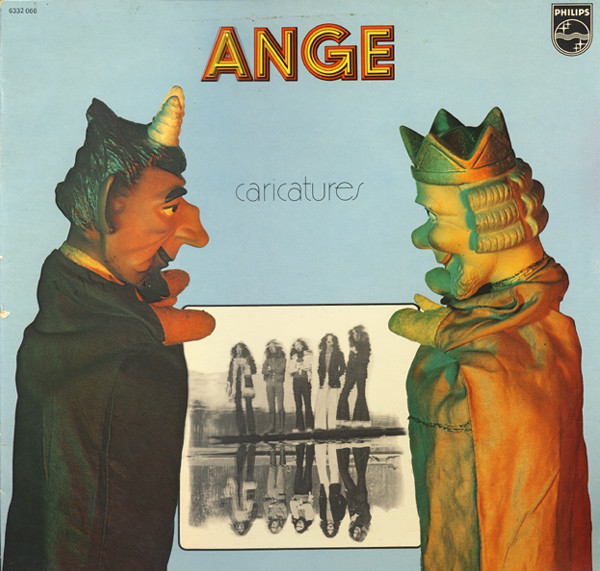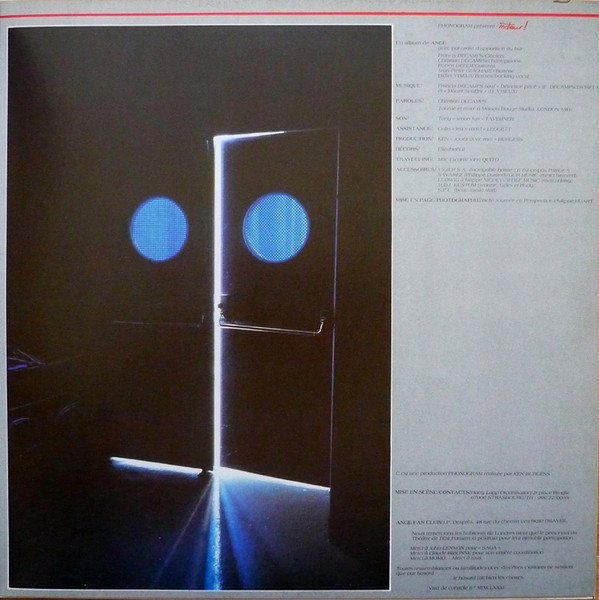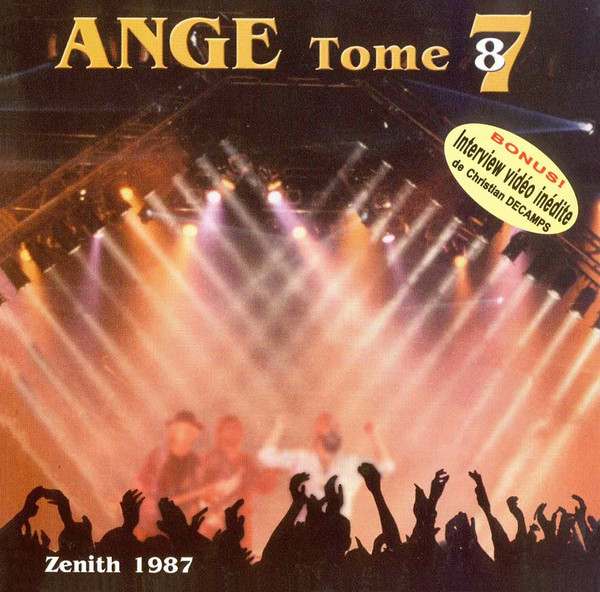Ange
Ange è un gruppo francese di rock progressivo formato nel settembre del 1969 dai fratelli Francis (tastiere) e Christian Décamps (voce, fisarmonica, chitarra acustica e tastiere).
Storia
La formazione che contraddistingue il primo periodo del gruppo, quello più propriamente progressive e generalmente considerato il migliore, è completata da Jean-Michel Brézovar alla chitarra, Daniel Haas al basso (e alla chitarra acustica) e Gérard Jelsch (sostituito da Guénolé Biger a partire da Emile Jacotey) alla batteria. Il suono del gruppo, seppur già personale e maturo, presenta all'inizio influenze dei Genesis e soprattutto dei King Crimson, benché gli Ange si dimostrino più caldi e lirici, specie nei cantati.
Il suo primo successo in Francia è stato la cover del brano di Jacques Brel Ces gens-là, presente sul loro secondo album Le Cimetière des Arlequins. La band ha tenuto il suo primo concerto il 30 gennaio 1970 al centro culturale "La Pépinière" a Belfort in Francia. Essi hanno eseguito 110 concerti in Gran Bretagna tra il 1973 e il 1976, aprendo il concerto dei Genesis al Reading Festival il 26 agosto 1973, di fronte a 30.000 spettatori.
Uno dei motivi per i quali la band non è riuscita a sfondare nel mercato britannico era perché cantava in francese. Gli Ange alla fine pubblicarono una versione inglese del loro quinto album Par les fils de Mandrin (By the sons of Mandrin), che però vendette poco ed è difficile da trovare, quantunque questa versione sia stata resa disponibile su CD. Purtroppo, dopo tre album, la qualità creativa aveva iniziato a diminuire e Par les fils de Mandrin non è stata probabilmente una buona scelta per cercare di irrompere nel mercato britannico. Au delà du délire, il terzo album, potrebbe essere il miglior prodotto del gruppo ed è consigliato come primo ascolto.
Dopo Par les fils de Mandrin e l'ottimo doppio album live Tome VI, la band ha usato il mellotron in Guet-apens e poi ha fatto un cambio di direzione verso uno stile più orientato al rock, anche se nel corso degli anni c'è stato qualche ritorno progressive, come per esempio nell'album Les larmes du Dalaï-Lama del 1992. Sponsorizzati dalla radio francese RTL, gli Ange fecero delle continue tournée fino alla fine del 1977, avendo una media di of 5.000-6.000 spettatori per concerto. Durante i primi anni (generalmente considerati i migliori), gli altri tre membri della band erano Jean-Michel Brézovar alla chitarra e flauto, Gérard Jelsch alla batteria e Daniel Hass al basso (e chitarra acustica). Nel 1995, gli Ange fecero l'annunciato tour d'addio.
Christian Décamps, prima di riprendere il nome di "Ange" nel 1999, ha pubblicato qualche album come "Christian Décamps et Fils", supportato dalla sua band. La nuova formazione degli Ange ha pubblicato diversi album, da La voiture à eau nel 1999, ed è stata presente al NEARfest del 2006; è ancora attiva nel 2011.
Francis Décamps e Jean-Michel Brézovar hanno pubblicato anche album solisti.
Curiosità
I suoni di tastiera della band negli anni '70, mentre ricordano un mellotron, sono di fatto stati generati da un organo Viscount per mezzo di un riverberoHammond. Tuttavia, come detto sopra, un vero mellotron è stato utilizzato nell'album Guet-Apens del 1978.
Discografia
Epoca Christian et Francis Décamps
- Caricatures (1972)
- Le Cimetière des Arlequins (1973)
- Au-delà du délire (1974)
- Emile Jacotey (1975)
- Par les fils de Mandrin (1976)
- By the sons of Mandrin (1977)
- Tome VI: Live 1977 (1977)
- Reimpression (Compilation) (1977)
- En concert: Live 1970-1971 (1977)
- Guet-apens (1978)
- Vu d'un chien (1980)
- Moteur (1981)
- À propos de... (1982)
- La Gare de Troyes (1983)
- Fou (1984)
- Egna (1986)
- Tout feu tout flamme... C'est pour de rire (1987)
- Sève qui peut (1989)
- Vagabondages (Compilation) (1989)
- Les larmes du Dalaï Lama (1992)
- Mémo (Compilation) (1994)
- Un p'tit tour et puis s'en vont: Live 1995 (1995)
- Rideau! : Live 1995 (1995)
- A...Dieu: Live 1995 (1996)
- Ego est au vermeil (Compilation) (1999)
- Sans filet: Live 1981 (collector) (2001)
- Tome 87 (Live) (2002)
- Ange en concert: Par les fils de Mandrin (Millésimé 77) (2004)
Epoca Christian e Tristan Décamps
- La Voiture à eau (1999)
- Rêve partie: Live 2000 (2000)
- Culinaire lingus (2001)
- ? (2005)
- Souffleurs de Vers (2007)
- Zénith An II: Live 2002 (2007)
- Le bois travaille, même le dimanche (2010)
- moyen age (2012)
- émile jacotey "résurection" (2014)
Christian Décamps et Fils
- Le mal d'Adam (1979)
- Juste une ligne bleue (1990)
- Nu (1994)
- V'soul Vesoul V'soul (1995)
- 3e étoile à gauche (1997)
- Murmures (2003)
Ange (English: Angel) is a French progressive rock band formed in September 1969 by the Décamps brothers, Francis (keyboards) and Christian (vocals, accordion, acoustic guitar and keyboards).
Since its inception the band's music has been inspired by medieval texts and fantasy.
History
Ange was initially influenced by Procol Harum and King Crimson, and their music was quite theatrical and poetic. Their first success in France was the cover of a Jacques Brel song, Ces gens-là, on their second album Le Cimetière des Arlequins. The band provided its first concert on January 30, 1970, at the cultural center "La Pépinière", in Belfort, France. They performed 110 concerts in England from 1973 to 1976, opening for Genesis at the Reading Festival in England, on August 26, 1973, fronting some 30.000 listeners.
One of the reasons for which the band was unable to break through into the British market was because they sang in French. Ange eventually released an English-speaking version of its fifth album Par les fils de Mandrin (By the sons of Mandrin), which was hard to find and sold poorly, although this version has since been made available on CD. Unfortunately, after three albums, the quality of creation had started to decrease, and Par les fils de Mandrin was probably not a good choice to try to break into the British market.
Following Par les fils de Mandrin and the live double album Tome VI, the band issued a mellotron–centered album, Guet-apens, and then had a more rock-oriented change of direction, although various progressive reformations occurred over the years, e.g. for the 1992 album Les larmes du Dalaï-Lama. Sponsored by the French radio RTL, Ange relentlessly toured until the end of 1977, welcoming an average of 5,000 to 6,000 listeners per show. During their first years (generally regarded as the best ones), the other three members of the band were Jean-Michel Brézovar on guitar and flute, Gérard Jelsch on drums, and Daniel Haas on bass (and acoustic guitar). In 1995, Ange played their farewell tour.
Christian Décamps released a few albums as "Christian Décamps et Fils" ("Christian Décamps and Son"), before taking over the name "Ange" in 1999, and is backed by his band for his solo albums. The new lineup has issued several albums from La voiture à eau in 1999, performed on 2006 edition of NEARfest and was still on the road in 2013.
Francis Décamps and Jean-Michel Brézovar have also released solo albums.
Keyboards
The keyboard sounds of the '70s-era band, while reminiscent of a mellotron, were in fact generated from a Viscount organ through a modded Hammond reverb. However, an actual mellotron was played on the album Par Les Fils De Mandrin in 1976.
Studio discography
Complete discography |
Christian and Francis Décamps era |
|
Christian and Tristan Décamps era |
- La Voiture À Eau (1999)
- Rêves Parties (2000, live, 2CD)
- Culinaire Lingus (2001)
- ? (2005)
- Le Tour De La Question (2007)
- Zénith An II (2007, live, 2CD)
- Souffleurs De Vers (2007)
- Souffleurs De Vers Tour (Live CD+DVD, 2009)
- Le Bois Travaille Même Le Dimanche (2010)
- Escale À Ch'tiland (2CD+DVD, 2011, live)
- Moyen-Âge (2012)
- Emile Jacotey Résurrection (2014)
- Emile Jacotey Résurrection Live (CD+DVD, 2015)
- La Bataille du sucre (2015, ltd ed w/ 4 songs)
- Heureux (2018)
Christian Décamps & Fils
|
- From 1999 on, Ange Fanclub Un pied dans la marge has produced at least 20 CD or DVD containing mostly live material.
Personnel
Current members
- Christian Décamps - Lead vocals, Keyboards (after 1970)
- Tristan Décamps - Keyboards, Backing Vocals (after 1997)
- Hassan Hajdi - Guitars (after 1997)
- Thierry Sidhoum - Bass (after 1997)
- Benoît Cazzulini - Drums (after 2003)
Former Members
- Francis Décamps - Keyboards, Vocals (1970–1995)
- Jean-Michel Brézovar - Guitars (1970–1977, 1988–1989, 1991–1995)
- Jean-Claude Rio - Rhythmic Guitar (1970)
- Patrick Kachanian - Bass, Flute (1970)
- Daniel Haas - Bass (1971–1977, 1988–1995)
- Gérard Jelsch - Drums, Percussions (1970–1974, 1994–1995)
- Guénolé Biger - Drums, Percussions (1975)
- Jean-Pierre Guichard - Drums (1976–1981, 1988–1992)
- Claude Demet - Guitars (1978, 1990)
- Gérald Renard - Bass (1978–1979)
- Mauro Serri - Guitars (1979)
- Jean-Marie Schreiner - Drums (1979, 1990)
- J. Frieden - Keyboards (1979)
- J. Migaud - Keyboards (1979)
- Robert Defer - Guitars (1980–1981, 1990)
- Didier Viseux - Bass (1980–1981)
- Frederick Chojnacki - Bass (1980–1981)
- Serge Cuénot - Guitars (1982–1987, 1990)
- Laurent Sigrist - Bass (1982–1987)
- Gabriel Troyan - Bass in Tout feu tout flamme (1987)
- Jean-Claude Potin - Drums (1982–1986)
- Francis Meyer - Drums (1987)
- Martine Kesselburg - Choir in Tout feu tout flamme (1987) - Vocals (1990)
- Eva Santi - Choir in Tout feu tout flamme (1987)
- Bruno Nion - Vocals in Sève qui peut (1989)
- Fabrice Bony - Drums (1993)
- Jean-Pascal Boffo - Guitars (1995)
- Hervé Rouyer - Drums, Percussions (1995, 1997–2002)
- Caroline Crozat - Vocals, Choir (2001–2010)
-
Ces Gens là ANGE album le Cimetière des Arlequins4:46
-
Aujourd'hui c'est la fete chez l'apprenti Sorcier ANGE album3:31
Visualizza la playlist completa

Visualizza la playlist completa










































































































































































Nessun commento:
Posta un commento